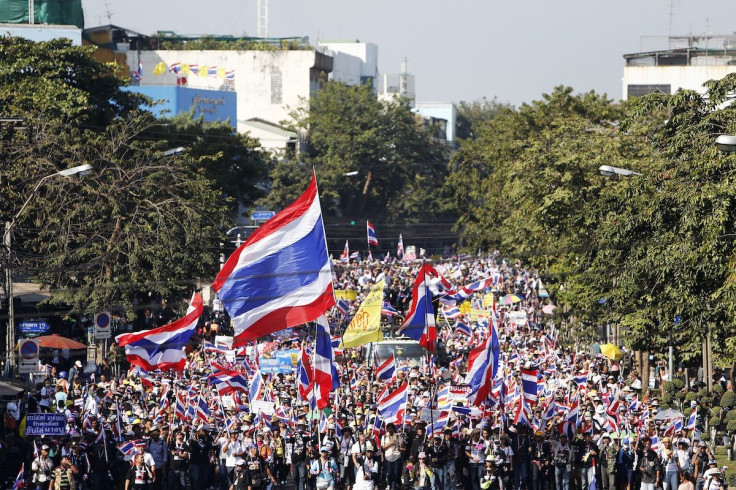Despite Bangkok Protests, Thailand Tourism Officials Say City Is Open For Business

A fresh wave of massive anti-government protests kicked off in Bangkok Monday as demonstrators vowed to completely shut down the Thai capital ahead of general elections next month. Despite the threatened closures, however, the Tourism Authority of Thailand remained adamant that the city was open for business and has put in place several measures to ensure a warm welcome and safe onward journey.
Those measures include a tourist care center at the Sports Authority of Thailand at Hua Mak Stadium and tourist care units at both Suvarnabhumi and Don Mueang international airports to coordinate with all concerned public and private agencies.
TAT said it was working with the Tourist Police, Immigration Bureau, Metropolitan Police Bureau, Railway Police Unit, Tourism Council of Thailand, Thai Hotels Association, Road Passenger Transport Association and Association of Thai Travel Agents to ensure all involved in the tourism industry were united in their efforts.
“The measures are the results of a meeting between all authorities involved and several major travel and tourism organizations,” Thawatchai Arunyik, governor of TAT, explained in a statement. “Our aim is to ensure safety and convenience to tourists while traveling within Bangkok and to and from both Suvarnabhumi and Don Mueang international airports during the current ongoing anti-government demonstrations.”
In addition to the tourist care centers and units, TAT set up tourist help desks at several BTS skytrain and MRT subway stations that are manned by Tourist Police officers. Accommodation near the airports has also been reserved for tourists waiting or arriving late for their flights.
Monday was the first day in a new series of demonstrations aimed at pressuring Prime Minister Yingluck Shinawatra’s government to step down. Protests first erupted in November when the government attempted to force through a political amnesty bill that would have enabled the return of former leader Thaksin Shinawatra, Yingluck’s billionaire brother who was ousted in a military coup in 2006 on charges of corruption. Thaksin now lives in self-imposed exile in Dubai to avoid a prison term, though he argues his punishment was politically motivated.
Many protesters claim that Yingluck’s government is, in fact, controlled by her brother. Fearing that she may win the Feb. 2 elections on the back of support in the rural north and northeast, they’ve called for her to step down and be replaced by an appointed “people’s council” to push through electoral reforms.
Large-scale protests took place in six areas of downtown Bangkok and one government center Monday, and were largely peaceful. TAT described the demonstrations as having a “festival vibe,” and assured visitors that life in Bangkok and throughout Thailand “continues as per usual.”
Most banks, hotels, convention centers, restaurants and entertainment centers are open, as are all tourist attractions in and around Bangkok such as the Grand Palace, Temple of the Emerald Buddha, Vimanmek Mansion and Siam Paragon. Nevertheless, tourism officials urged visitors to use the skytrain, subway or airport rail link to get to and from destinations as a precaution against unforeseen traffic delays caused by several road closures.
Protest leader Suthep Thaugsuban assured that the shutdown would not explicitly target tourists, and promised not to disrupt the city’s public infrastructure, including city buses and vans, BTS skytrain, MRT subway and the airport rail link. Despite these assurances, and despite promises of a peaceful protest, the streets of Bangkok remained heavily patrolled Monday.
“Tourists need not be alarmed by the presence of security forces in Bangkok today,” TAT said in a situation update Monday. “More than 20,000 police and military personnel will be deployed in important areas and at key state agencies in the capital to maintain peace and order.”
TAT said it was closely monitoring the state of affairs and would continue to issue daily situation updates to keep tourists and the tourism industry abreast of any changes.
Prolonged protests have begun to take their toll on Thailand. Hotel occupancy in Bangkok is expected to fall by 30 to 40 percent in the first quarter of 2014, while TAT predicts a 5 percent decline in visitor numbers for the first quarter if demonstrations continue.
Thailand’s Foreign Ministry said 45 countries, including Britain, France, Germany, Japan, Canada and Brazil, had issued travel advisories urging citizens to avoid visiting areas near protest camps in the capital. The U.S. Embassy in Bangkok also issued a message to American citizens in Thailand, warning that political unrest could continue for some time.
“While protests have been generally peaceful over the last two months, some have resulted in injury and death. Even demonstrations that are meant to be peaceful can turn confrontational and escalate into violence,” the embassy said in its message. “You should avoid areas of demonstrations, and exercise caution if in the vicinity of any large gatherings, protests or demonstrations. Be alert and aware of your surroundings and pay attention to local news media reports.”
The embassy advised U.S. citizens to have a week’s supply of cash on hand, keep mobile communication devices charged, and stock up on food, water and medicine as a precaution.
Tourists currently in Thailand can seek assistance by calling the following hotlines:
Tourism Authority of Thailand -- 1672
Thai Tourist Police -- 1155
Suvarnabhumi Airport Operation Centre -- 02 134 4077
Don Mueang Airport Operation Centre -- 02 535 3431
Tourist Assistant Centre (temporary) -- 02 401 1111
© Copyright IBTimes 2024. All rights reserved.












